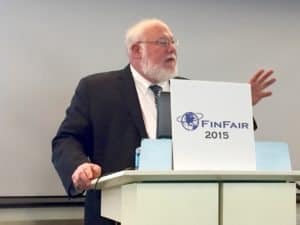 Under Reg D more than a trillion dollars is raised each year for companies that are not publicly traded. This market is huge – far larger than the annual rate of IPOs. Yet these private placements are only available to “accredited investors”: Individuals who earn $200,000+ a year or maintain a net worth of $1 million (minus one’s primary residence). There is a widely circulated presentation created by Andreessen Horowitz that indicates much of the wealth created by young companies has already been captured before a company finally goes public (if it ever gets that far). So an IPO has become more of an exit for early investors. Retail investors are left with tepid growth. Thus the vast majority of the population is blocked from a potential source of profound wealth creation – an incredible act of disenfranchisement.
Under Reg D more than a trillion dollars is raised each year for companies that are not publicly traded. This market is huge – far larger than the annual rate of IPOs. Yet these private placements are only available to “accredited investors”: Individuals who earn $200,000+ a year or maintain a net worth of $1 million (minus one’s primary residence). There is a widely circulated presentation created by Andreessen Horowitz that indicates much of the wealth created by young companies has already been captured before a company finally goes public (if it ever gets that far). So an IPO has become more of an exit for early investors. Retail investors are left with tepid growth. Thus the vast majority of the population is blocked from a potential source of profound wealth creation – an incredible act of disenfranchisement.
 David Burton, a Senior Fellow for Economic Policy at the Heritage Foundation, has published a paper that outlines how things work today. He also explains what must be done. Burton states;
David Burton, a Senior Fellow for Economic Policy at the Heritage Foundation, has published a paper that outlines how things work today. He also explains what must be done. Burton states;
“Congress should address this problem by providing bright-line rules for determining who is sophisticated and therefore eligible to invest in Regulation D private placements. This would increase the number of people who are allowed to invest in private firms, broadening the options available to investors and helping entrepreneurs to raise capital.”
Burton notes that a bill, labeled the Fair Investment Opportunities for Professional Experts Act, has passed the House. This may fix the issue but, as it is worded now, leaves too many ambiguities increasing the risk that the authors legislative intent may get lost in the regulatory shuffle.
Burton clarifies things, stating;
“[the bill should] be improved by broadening the definition of who would qualify as sophisticated by specifying the educational, licensure, or accreditation attainment that would make a person eligible, while allowing financial regulators the option of further broadening who qualifies. It should also minimize the role of FINRA.”
We concur.
Policy makers on Capitol Hill should read this document.
[scribd id=321518350 key=key-1yKh4IGYhzXtE4VDvSLo mode=scroll]

